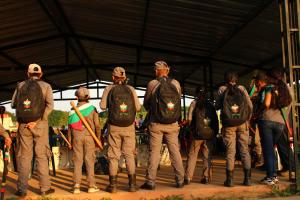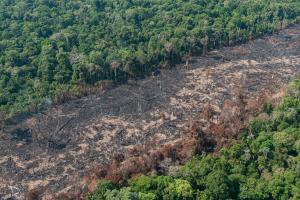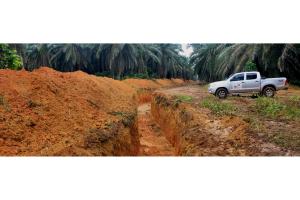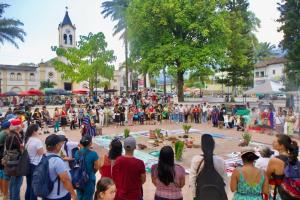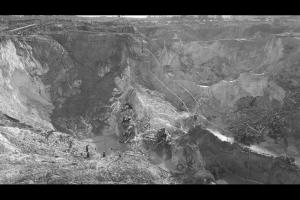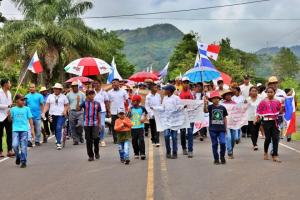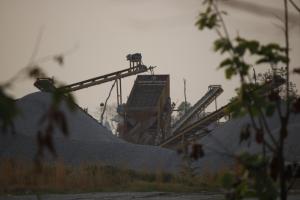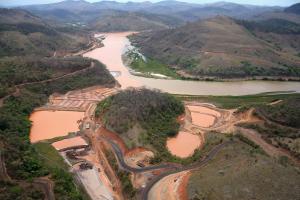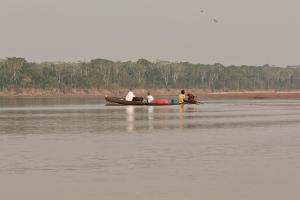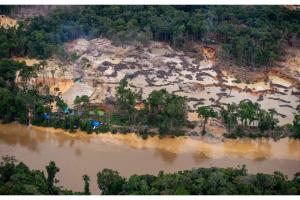Large-Scale Mining
Fueled by ever-increasing demand and the boom-and-bust cycles of global commodity markets, large-scale mining destroys forests and pollutes soil, air and water. Violent conflicts, sexual exploitation, criminalization and displacement of communities living in forests destroyed for mining, are examples of social impacts that are inherently linked with the mining industry.
Bulletin articles
22 August 2024
Colombia's Orinoquía region stretches from the foothills of the country's eastern mountain range to the Venezuelan border. This region has historically been associated with the exploitation of rubber, timber, furs and other so-called “natural resources,” to the detriment of ancestral communities. Today, new threats are emerging under the paradigm of conservation, green energy and carbon projects.
Bulletin articles
27 February 2024
The Amazon region is one of the final frontiers of resistance to capital expansion. This is epitomized by the struggles of social activists such as Chico Mendes, as well as by the presence of most of the earth’s remaining indigenous peoples in voluntary isolation. However, different forms of ‘green’ extractivism are currently and increasingly advancing on this territory.
Bulletin articles
26 February 2024
In the Acará Valley, Pará state, the Tembé and Turiwara indigenous peoples, and quilombola and peasant communities are fighting to take back part of the living spaces they traditionally occupied. It is not just a struggle for territory, but one to reverse a history of oppression and injustice. Today, they are denouncing structural violence and state omission.
Bulletin articles
26 February 2024
Mocoa is located between the Andean mountains and the Colombian Amazon, in the middle of one of the most important river basins of the country; in this territory, indigenous communities, Afro-Descendants, peasants and settlers coexist. The growing demand for minerals for the “decarbonization” of the world is a threat to this region, where mining companies are trying to move forward with underground copper extraction.
Bulletin articles
26 February 2024
In recent years, one of the biggest threats to the Venezuelan Amazon and to the Indigenous Peoples who inhabit it has been mining, especially gold mining.
Bulletin articles
19 December 2023
Almost 30 years of UN climate negotiations have resulted in the establishment of policies and practices that facilitate the constant expansion of the fossil fuel-based economy (and its profits) while hiding its implacable negative impacts for the territories where it expands.
Bulletin articles
19 December 2023
2023 culminates with a victory for the popular struggle to defend life in Panama. This will influence every corner on earth where, in the face of environmental conflicts, people are resisting and defending their territory.
Bulletin articles
30 March 2023
Forests in Cambodia have seen large-scale deforestation with rubber and cassava plantations, illegal logging and other economic interests. Besides, Protected Areas and carbon projects like REDD+ have severely affected forest communities. Despite the criminalization, communities fight back, underlining the important connection between living with their forests and having autonomy to enough, diverse and nutritious food.
Bulletin articles
30 March 2023
Ending fossil fuel burning is urgent, yet oil and gas companies have been ramping up production and profits in 2022. Polluters greenwash their activities saying they offset their emissions with investments in ‘nature-based solutions’, which mean land grabbing, violence and corporate control over vast areas of land in the global South.
Bulletin articles
16 January 2023
Most of the causes of deforestation that were identified in a UN-led global analysis from 1999 continue to exist. Yet, the “solutions” proposed since then have become new underlying causes of deforestation. In this scenario, projects that destroy the forest and “green” projects depend on each other in order to be viable.
Bulletin articles
12 September 2022
The Beni River in the Bolivian Amazon is under threat. While the government seeks to install mega-dams that would flood an area much larger than the capital, La Paz, mining and its concomitant mercury contamination continue to bring illness to these territories.
Bulletin articles
12 September 2022
The discourse of the 'energy transition' is usually used to justify the expansion of the mineral extractive frontier. However, in addition to local pollution and impacts on forests and people, the extraction and processing of minerals require large quantities of water, with long-lasting and far-reaching effects on territories.
